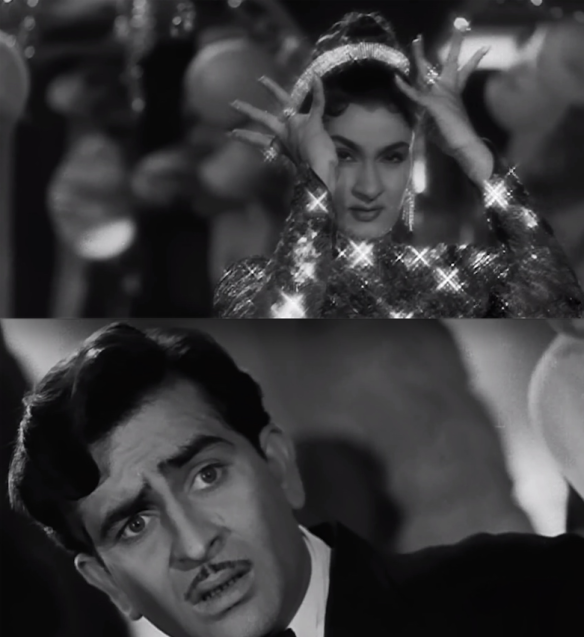
In a classic example of a dutch angle, Raj Kapoor recoils from the snake-like Nadira in Shree 420 (1955).
Today we present the lyrics and English translation of the famous “Ramaiya Vastavaiya” from Raj Kapoor’s 1955 blockbuster Shree 420. One of the most priceless gems of India’s Golden Age of Cinema, Shree 420 is a showman’s dream. In an era when the aesthetic of film was still an experimental playground, Raj Kapoor’s Shree 420 is as original and evocative as it was 60 years ago.
Raju, played by Raj Kapoor himself, arrives in Bombay as a patriotic simpleton crooning “Mera Joota Hai Japani.” In a pawnshop, Raju encounters Vidya (played by Nargis, in her final romantic appearance opposite Raj Kapoor under his banner production company), a pretty teacher who is selling her bangles to help pay for her struggling school (and whose name redundantly means “knowledge.”) For the next few weeks, Raju works hard to both earn a decent living at a laundry service and to woo the principled Vidya, dreaming of a simple and happy future family.
However, this utopian simplicity does not last long. When Raju delivers some pressed shirts to a wealthy flat, he meets Maya (whose name significantly means “illusion”), a high society woman who thrives on parties and gambling with the rich. She recognizes Raju’s untapped potential as a cunning cardshark, and lures him to a fancy soiree where she introduces him as Rajkumar, the Prince of Pipalinagar, of all things ridiculous. This brief taste of luxury and easy money leads Raju to agree to form a partnership with the corrupt industrialist Seth Dharamanand, bringing him instant wealth.
But Raju’s whirlwind romance with high Bombay society is stained by the shame Vidhya instills in him for his actions, and one night at the nightclub, he sees Maya and her world of illusion for what they truly are. He runs away in horror back to the slums that once gave him a home. Enter the song “Ramaiya Vastavaiya,” a cute villager number complete with chorus girls in native dress and a heavy-handed reminder that yes, poor people can be happy too.
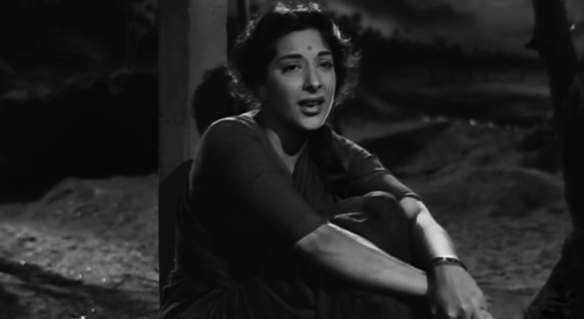
Nargis plays a virtuous, impoverished schoolteacher who struggles to give her students a better life in Shree 420 (1955).
Of course, the question you really want answered is, what the heck does “Ramaiya vastavaiya” mean?
It turns out Ramaiya vastavaiya is Telegu for respectfully asking, “Ram, won’t you come?” Legend has it that music composer Shankar Singh Raghuvanshi, who grew up in Hyderabad where Telugu is a dominant language, had been demonstrating his composition to director Raj Kapoor using placeholder Telugu lyrics. When Raj Kapoor heard the tune, he loved it so much, he wanted the Telugu title lyrics to be included in the final version! And perhaps the convenient symbolism did not escape Raj Kapoor–like Lord Ram returning at last to his kingdom, Raju finally comes back to the people who love him and his true home.
But all that aside, the real reason everyone has adored “Ramaiya Vastavaiya” for generations is simply that it’s so darn catchy. If you hear it once, you’ll be humming it all day! We hope you enjoy our English translation to the lyrics of this all-time favorite below. Follow along with the video and let us know in the comments how much your mind was blown like ours by the discovery of Ramaiya vastavaiya‘s Telugu roots.
Ramaiya Vastavaiya Lyrics and English Translation:
Mohammed Rafi:
Ramayyaa vastaavayyaa, ramayyaa vastaavayyaa
Ram, will you return?
Lata Mangeshkar:
Mai.N ne dil tujhko diyaa
I have given you my heart
Chorus:
Haa.N ramayyaa vastaavayyaa, ramayyaa vastaavayyaa
Yes, Ram, will you return?
Mai.N ne dil tujhko diyaa
I have given you my heart
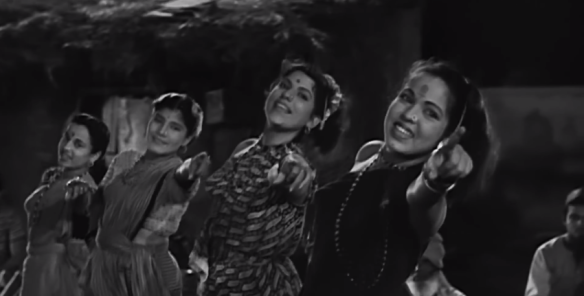
Dancer Sheela Vaz plays a stock village girl with all the right morals in Shree 420 (1955). While shooting the song, Sheila Vaz, who did not speak Hindi, studied a translation of “Ramaiya Vastavaiya” and faked it till she made it!
Mohammed Rafi:
Naino.N mei.N thii pyaar kii roshnii
In your eyes was the light of love
Teri aankho.N me yeh duniyaadaari na thii
This worldliness was not in your eyes then
Lata Mangeshkar:
Tu aur thaa teraa dil aur thaa
You were different, your heart was different
Tere man mei.N yeh miThi kaTaari na thii
This sweet dagger was not in your heart then
Mohammed Rafi:
Mai.n jo dukh paauu.N, to kyaa? Aaj pachhataauu.N, to kyaa?
If I become sad, so what? If I regret today, so what?
Chorus:
Maine dil tujhko diyaa
I have given you my heart
Oh ramayyaa vastaavayyaa, ramayyaa vastaavayyaa
Oh, Ram, will you return?
Mohammed Rafi:
Us desh mei.N tere pardes mei.N
In that country, in your foreign land
Sone chaa.Ndi ke badle mei.N bhikate hai.N dil
Instead of gold and silver, they sell hearts
Lata Mangeshkar:
Is gaao.N mei.N, dard ki chhaao.N mei.N
In this village, in the shadow of pain
Pyaar ke naam par hii dhaDakte hai.N dil
Hearts beat only in the name of love
Chaand taaro.N ke tale, raat yeh gaatii chale
In the tent of the moon and stars, the night sings this songs
Maine dil tujhko diyaa
I have given you my heart
Chorus:
Oh ramayyaa vastaavayyaa, ramayyaa vastaavayyaa
Oh, Ram, will you return?
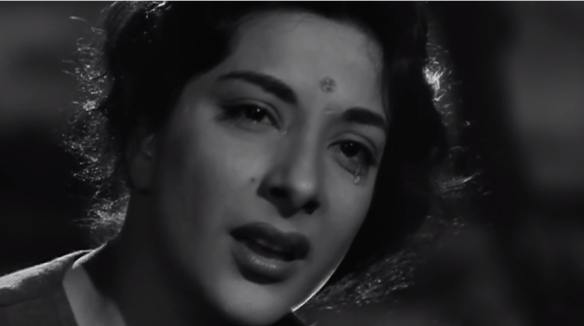
Joining in on the song playing on everyone’s lips in town, Nargis mourns for her lost love in Shree 420 (1955).
Lata Mangeshkar:
Yaad aati rahii dil dukhaati rahii
I still remember you, my hearts still grieves
Apne man ko manaanaa na aayaa hame.N
But I do not know how to conciliate my own mind
Tu na aaye to kyaa? Bhuul jaaye, to kyaa?
If you do not come, so what? If you forget, so what?
Pyaar karke bhulaanaa na aayaa hame.N
But having fallen in love, I do not know how to make myself forget
Wohii se duur se hii, tu bhi yeh keh de kabhii
Even from far away, say this sometime
Maine dil tujhko diyaa
I have given you my heart
Chorus:
Oh ramayyaa vastaavayyaa, ramayyaa vastaavayyaa
Oh, Ram, will you return?
Mukesh:
Maine dil tujhko diyaa
I have given you my heart
Chorus:
Oh ramayyaa vastaavayyaa, ramayyaa vastaavayyaa
Oh, Ram, will you return?
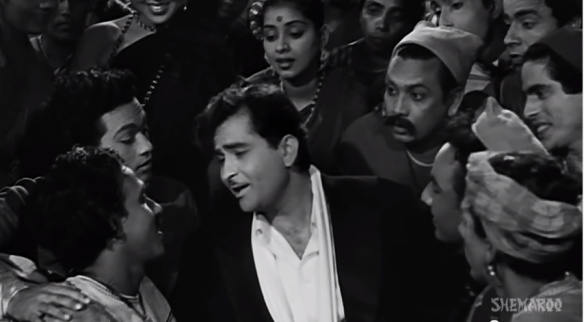
Embodying the return of Lord Ram, Raj Kapoor leaves the glitzy world of Bombay nightlife to engage a captive audience of villagers in Shree 420 (1955).
Mukesh:
Rastaa wohii aur musaafir wohii
The path is the same and the traveler is the same
Ek taaraa na jaane kahaa.N chhup gayaa
But I do not know where that star has hidden itself
Duniyaa wohii duniyaawaale wohii
The society is the same, the citizens are the same
Koi kyaa jaane kiskaa jahaa.N luT gayaa
No one knows whose world has been destroyed
Merii aankho mei.N rahe, kaun jo mujh se kahe?
Who once told me to remain forever in their eyes?
Maine dil tujhko diyaa
I have given you my heart
Chorus:
Oh ramayyaa vastaavayyaa, ramayyaa vastaavayyaa
Oh, Ram, will you return?
Glossary:
Ramya vastavaiyaa: Ram, will you come (Telugu); dil: heart; nain: eyes; pyaar: love; roshnii: light; aankhe.N: eyes; duniyaadaari: wordliness; man: mind; heart; miiThaa: sweet; kaTaarii: small dagger; dukh: sadness; pacchtaanaa: to regret; desh: country (India); pardes: foreign country; sonaa: gold; chaa.Ndii: silver; [kisi ke] badle mei.N: in place of [something]; bhiktaanaa: to sell; gaao.N: village; dard: pain; chaao.N: shadow; naam: name: dhaDaknaa: [the heart] to beat; chaa.Nd: moon; taaraa: star; raat: night; gaanaa: to sing; yaad aanaa: to remember; dukhaanaa: to grieve; manaanaa: to conciliate, to cajole; bhuul jaanaa: to forget; bhuulaanaa: to make [someone] forget; duur: far away; kabhii: sometime; rastaa: path; musaafir: traveler; chhup jaanaa: to hide; duniyaa: society, the world; duniyaawaale: citizens; jahaa.N: world; luT gayaa: destroyed
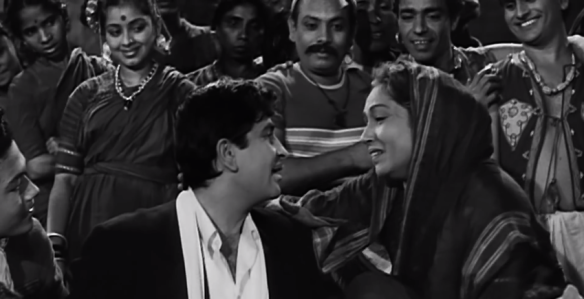
With motherly affection, Lalita Pawar welcomes Raj Kapoor back to the fold with open arms in Shree 420 (1955).
The moral dilemma that plagues Raju’s existence eventually comes to a climax when Seth Dharamanand, Maya, and Raju are incriminated for swindling money from the poor to build communal houses. Seeking to atone for the past, Raju address the scores of poor people awaiting a home. Perhaps it is impossible to build houses for each person individually, he says, but they are a group of a million people, now united, and if they go to the government and demand land, they have the power to build their own homes with their combined money. The cure to poverty for the nation, he preaches, is not dishonesty, but hard-work and determination. Raju is released from his charges, and returns to the lifestyle of an honest workingman as he began, joined by Vidya who has forgiven him. The film finishes, humbled and hopeful, with the two heading down the road of life together.
Thank you to our fans Mustafa and Onima Thakur for this inspiring request!
-Mrs. 55
P.S. Be sure to watch the music video of this song and appreciate Raj Kapoor’s novel song transitions! Halfway through the song, the camera tracks “Ramaiya Vastavaiya” as it is picked up from the dancing villager’s circle by a passing horse carriage, overheard by a bicyclist, who carries the melody to Nargis sitting alone miles away, thereby fluidly retaining the realism of the sequence. Song transitions were still uncharted territory in this infant age of cinema–and Raj Kapoor, like the the great Guru Dutt, was a genius and pioneer. OK, OK I promise that’s the last thing I’m going to say about this song–but seriously, every scene in this movie is a film-lover’s gold mine!
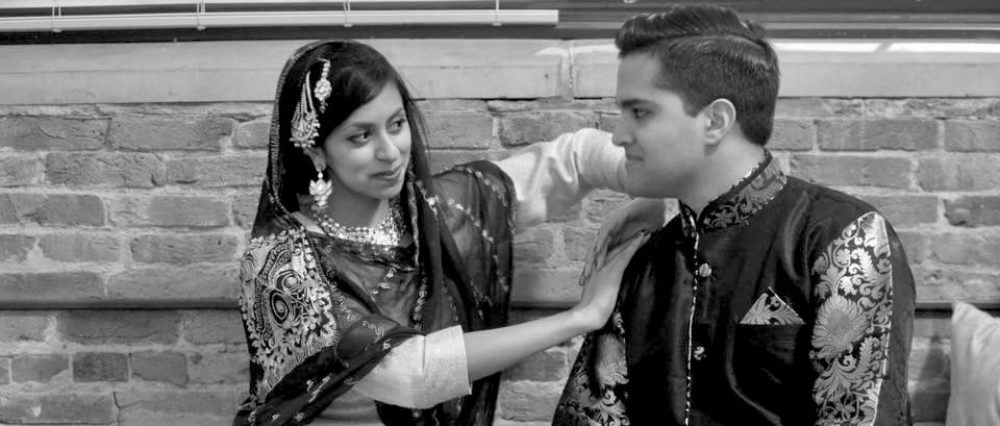
Thanks for translating and explaining.
Thank you for reading!
another great translation, wonderful job!
We are so happy you enjoyed the translation!
I didn’t know this
I had always assumed that this was a nonsense lyric made for the convenience of the song- in fact in my mind for some reason it was always ramaiya vatavaiya and not vastavaiya which of course makes sense now that I read your blog
Which reminds me how special your blog is and how it really contributes to our understanding not only of Bollywood but about the larger spiritual and cultural context of the Indian subcontinent
So congratulations on an outstanding post once again. I learnt a lot.
PS
You did not spend much time on the opening sequence (the nadira cabaret)- the music is very much part of the era of dance clubs and is a particularly characteristic of a Bollywood interpretation of jazz and Afrocubanism, also see in many other movie including the famous sono gazar kya gaye from Baazi amongst many others
Perhaps you can devote a blog to this in the near future
Lalten, you would not be alone! We too had long assumed the words were just nonsensical–or if anything, maybe something in Marathi as that would fit into the linguistic culture of Bombay. We have been on a hunt to solve this mystery for some time–we’re glad we’re not the only ones who ask themselves these questions!
You bring up a great point about the cabaret number that opens the song, and is artfully filmed. While we did not have enough space to devote to that sequence in this post, we will absolutely be translating “Suno Gazar Kya Gaye” in the future where we can discuss the fascinating blend of cultures present in Indian cabaret numbers.
Thank you again for your kind words about our blog!
Mrs. 55
Great job! Actually I understood the meaning of the song entirely except the main phrase ‘ramaiya vastavaiya’! And it was actually funny, knew the whole song except for its mukhda! Similar with ‘daga daga wai wai’ from the film ‘Kali Topi Lal Rumal’. Understood the whole song except the mukhda! Can you please tell me the meaning if just this phrase ‘daga daga wai wai’. I guess its some Afghani language word
Thanks Apurv! We were always in the dark the same way as you. “Daga Daga Wai Wai” is a very interesting selection, with a similar problem as you point out. We’ll make sure to keep it in mind for an upcoming post!
vastavayya word is from telugu language, meaning is correct in the lyrics
I wonder if this rather pedestrian song deserves to be among all the wonderful songs you have workec on. Shree 420 was possibly the least interesting of RK productions, what with Maya and Vidya and that ridiculous nationalism in Mera jhootha hain Japaani.
In any case the last romantic pairing of Raj and Nargis was Chori Chori.
Sri 420 is the last Nargis Raj romantic pairing in an RK production.
Hi Gaby,
Thank you for pointing out the details of the Nargis-Raj Kapoor timeline! You’re correct and we’ve clarified accordingly. Shree 420 is one of India’s best films, at least in our opinions! What may seem cliched and heavy-handed now were novel and ground-breaking at the time. Shree 420 is one of the great films in which every shot is carefully constructed to tell a story beyond the mere words spoken in the dialogue–“Ramaiya Vastavaiya” being no exception! We try to make no distinction in selecting our songs on the basis of their mass appeal, but rather on the basis of their cultural, historical, or artistic merit. And to truly love old films we do, we fully embrace even their flaws 🙂
Mrs. 55
Hey guys,
All I said was that Sri 420 was the least interesting of RK movies. However even his least interesting is far superior to the best efforts of many others. I did not particularly like the allegory of Maya and Vidya and the rather crass nationalism of Mera Jhootha hain Japaani.
Nadira was magnificent as was Mudmudke na dekh mud mudmudke and then Eenchak dhana was a really interesting song. Sad that we simply dont agree on the artistic merits of the one song in question 😃😂😃
Then we shall agree to disagree 🙂 Many people share your feelings about his heavy-handed style, so no hard feelings whatsoever. But at least we can all appreciate that tour de force that was Nadira in Mud Mud Ke Na Dekh–she was magnificent! It’s not easy to be so alluring and yet so repulsive all at once!
Thank you for another translation, it’s gold for us non Hindi speakers. Keep up the good work. And Congratulations to Mrs 55 🙂
Thank you, Satya! This translation was particularly fun as neither Mr. 55 nor myself were familiar with its Telugu origins previously. Many thanks for your well wishes!
Thank you for the research and the blog Mr&Mrs 55. There are songs, like Ramaiya Vastvaiya, which stays with us forever and helps us on our life journey. The song transition as you explained but also the pick up by melodious Mukesh from the happy Lata and Rafi together with the tenor opening and closing are all the ingredients that Shree Raj Kapoor brought together to give us a Bollywood Massala – a gem.
In this age of information overload, your blogs and translations with the explanations bring me so much joy for which I am grateful.
Bon courage with the excellent work.
We appreciate your kind comment! The seamless switch between the flirtatious banter between Lata and Rafi to the truly regretful Mukesh and Lata solos are indeed fantastic–although the sentiments of the lyrics remain the same, the mood of the song changes entirely! Thanks again for following our posts!
I love the “wail” Rafi sings just before this song starts, can you imagine that in one of those old huge amazing cinemas, it would make your hair stand on end, no THX or dolby surround needed.
i grew up watching hindi cinema in old cinemas (made in the 30s) in England in the 1970s thats the effect Lata and Rafis song had, They were electric.
Shailendra was the lyricist for this song. Gulzar said he was the best lyricist in Bollywood. Listen to how his words pull on the heart strings here, beautiful song from a master.
As a side he was probably paid Rs 500 for this. or about £5.
Watching Raj Kapoor films on the big screen is how these films were meant to be seen–you had a rare treat! I’m glad you mentioned the Rafi “wail”–it’s so full of depth and sets the mood brilliantly after Raj Kapoor’s calamitous exit from the nightclub! It’s a shame how little an artist might be paid for his or her contributions, but in this case as many others, I think the price of the song’s enduring legacy is certainly beyond monetary value 🙂
We were indeed very fortunate that our parents took us to these cinemas here in the industrial North of England in the 70s. It was their escape back to the old country.
We would record the songs on cassette players with the microphone in the cinemas. You couldn’t get the songs any other way.
My friend Irna has written many articles and blogs on this subject. Here is one such article, hope you find it interesting. Hope it doesn’t break any of your rules:
http://www.theguardian.com/uk/the-northerner/2013/may/17/bradford-city-of-bollywood-dreams
Sanjay:
Thanks for providing such a beautiful explanation of the song. At last we know the meaning of words Ramaiya Vastawaiya. In fact I too always secretly admired the way the transitions have been built in the song…but there was no body to share my thoughts with…as you don’t find many people who go into subtle details and feel them. Glad that this is a platform where we can share and enjoy…Each and every piece of this song is a gem. Shailendra, Shankar-Jaikishan, Rafi, Lata, Mukesh, Raj Kapoor, Nargis, Sheela Vaj, Lalita Pawar…all have made this song electrifying. I agree with Gulzar on Shailendra…… Thanks again. This revie has made me again long for viewing the film on big screen..
Now I am looking forward to your review of “Suno Gazar kya Gaye”… “Mud Mud ke na dekh” and “Daga Daga wai wai wai”.
At this point of time, I have two more requests….”Sun Bairi Balam Sach Bol re ibu kya hoga” and “Ayega Aane Wala”….
Splendid rendering in Englsh, and the general explanations. Incidentally, meethi kataarii- should this not be rendered as “sweetened dagger” rather than as sweet dagger? Sweetened suggests the artificiality and the disguised threat.
you are doing a great job thanks. i would appreciate if you could explain worlds like kii ka ke kisi se and other similar words for us to better understand urdu/hindi.thanks
A BIG THANK!
In my dying days, at long last I see an intelligent and kind of professional translation of that song even if there is still room for improvement – although my knowledge of Hindustani (Hindi-Urdu) is very rudimentary!
Having been enslaved and colonised for hundreds of years the British made sure we lost our religious and cultural heritage thanks also to the complicity of corrupt Hindustani folks, and of political and religious misleaders!
BAFS
My ex-Boss frequently used to tell me “Presumption is mostly very dangerous”…Here,…After reading this song’s English translation, i have realised that my thinking was wrong….u are doing a great job….keep it up……….
India is yet to produce a greater showman than The Raj…Raj Kapoor
I grew up listening to the hits ofAah and Barsaat.In retrospec,any one can
compare with cotemporay tech and the sterling old renditions of
stalwarts….Rafi,Mukesh,Lata ,Bhosle who sang rreal-time and without
punching and synthesisers.This song is a classic.Ramayya Vastaaviya???
Ram,won’t you come?
everything in this song is perfect…Raj kapoor at its best
thanks.beast translation and explainatin.
Thanks a lot from TAJIKISTAN!
What a beautiful explanation about “RAMAIYA WASTAWAYYA” ! Unlike it very much and thank you all who have taken so much efforts to do this for a wonderful song. I was just searching for the same on the internet i found this marvelous thing. Again I thank all those who has taken part in doing all this hard work.